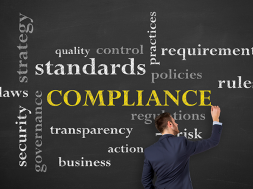
Staying Current With Title IX and Clery Act Requirements
By Katherine Brodie, Counsel, Ritzert & Leyton, PC
Sexual violence and its impact on students attending institutions of higher education has been a renewed focus of the Department of Education’s (ED’s) Office for Civil Rights (OCR) since the start of the Obama Administration in 2009 and the topic has received extensive coverage and debate in the media. In January 2014, President Obama signed a Presidential Memorandum establishing a White House Task Force to Protect Students from Sexual Assault. That Task Force issued a report in April 2014 and created a website for schools, students and the public at www.notalone.gov.
In addition, on October 20, 2014, ED published a Final Rule promulgating amendments made by Congress in the Violence Against Women Reauthorization Act of 2013 (“VAWA”) (Public Law 113-4) to the Jeanne Clery Disclosure of Campus Security Policy and Campus Crime Statistics Act, which is Section 485(h) of the Higher Education Act (20 U.S.C. § 1092(f), 34 C.F.R. §§ 668.41, 668.46).
The new rule goes into effect on July 1, 2015. What this means is that Title IV institutions are required to include in their Clery Act Annual Security Reports (ASRs) for calendar year 2014 (to be published and distributed by October 1, 2015) ALL required changes to policies, procedures and programs related to sexual violence under the Final Rule. Institutions must also include in that ASR the crime statistics information for the newly added reportable crime categories for calendar year 2013 and 2014, as discussed in further detail below.
Clery Act compliance is routinely checked by ED as part of Title IV program reviews.
OCR investigations into Title IX compliance is often initiated by student complaints filed with ED.
Title IX also contains a private right of action and schools have been subject to private lawsuits for failure to comply. Due to the significant financial and reputational harm that can result from Clery Act and/or Title IX non-compliance, we urge all Title IV institutions to devote sufficient attention in early 2015 to ensuring that their policies, procedures and programs meet the requirements of the new law. Career Education Review and Ritzert & Leyton PC presented an in-depth webinar on “Title IX and Sexual Violence in the College Setting” in November 2014, a copy of which is available on www.careereducationreview.net. The purpose of this article is to highlight key recent changes in the law:
What did the final rule change?
- All Title IV institutions must compile statistics about the number of incidents for sexual assault, domestic violence, dating violence and stalking, as defined in the Final Rule, for which the institution receives information (including through their Campus Security Authorities (CSAs) or from local police agencies) and report those statistics as part of their Annual Security Report (ASR).
Phase In: During the period after congressional enactment of VAWA in October 2013 and publication of the Final Rule, ED made clear that institutions had a “good faith” requirement to include accurate and complete statistics for these new categories in their ASR for calendar year 2013 (which was due by October 1, 2014). Now that the Final Rule has been published and is effective July 1, 2015, ED expects institutions to fully comply with the reporting obligations for these new crime categories for the calendar year 2014 ASR and forward (with the calendar year 2014 ASR due by October 1, 2015).
- As detailed below, the VAWA amendments also added in a significant way to the policies, procedures and programs that must be included in the ASR. Schools should be working now to ensure that their policies, procedures and programs are updated to comply with the new law in advance of the issuance of the calendar year 2014 ASR.
Key changes made by the final rule:
- Clarifies the very limited circumstances in which an institution may remove or not include reports of crimes that it has concluded are “unfounded” and requires institutions to report to ED and disclose in the ASR the number of such unfounded crime reports;
- Revises the definition of “rape” to reflect the FBI’s updated definition in the UCR Summary Reporting System;
- Revises the categories of bias for the purposes of Clery Act hate crime reporting to add gender identity and to separate ethnicity and national origin into separate categories;
- Requires institutions to provide to incoming students and new employees “primary” prevention programs and to describe such programs in their ASRs. These programs must include: (1) a statement that the institution prohibits the crimes of dating violence, domestic violence, sexual assault and stalking, as those terms are defined in the Final Rule; (2) the definitions of those terms under the law of the applicable jurisdiction (i.e., state law); (3) the definition of “consent,” in reference to sexual activity, in the applicable jurisdiction; (4) a description of safe and positive options for bystander intervention; (5) information on how to reduce risk of being a victim of sexual violence; and (6) information on the institution’s policies and procedures that will be followed after an alleged sex offense occurs;
- Requires institutions to provide, and describe in their ASRs, the “ongoing” prevention and awareness campaigns offered for students and employees, which must include the same information as contained in the institution’s primary prevention and awareness program (discussed immediately above) for incoming students and new employees;
- Requires institutions to describe each type of disciplinary proceeding used by the institution; the steps, anticipated timelines, and decision-making process for each type of disciplinary proceeding; how to file a disciplinary complaint, and how the institution determines what type of proceeding will be used based on the circumstances of an incident of alleged dating violence, domestic violence, sexual assault or stalking;
- Requires institutions to list all of the possible sanctions that the institution may impose following the results of any institutional disciplinary proceeding for an allegation of dating violence, domestic violence, sexual assault or stalking;
- Requires institutions to describe the range of protective measures that the institution may offer an accuser following an allegation of dating violence, domestic violence, sexual assault or stalking; and
- Requires institutions to provide for a prompt, fair, and impartial disciplinary proceeding in which: (1) officials are appropriately trained and do not have a conflict of interest or bias for or against the accuser or accused, (2) the accuser and accused have equal opportunities to have others present, including an advisor of their choice; (3) the accuser and accused receive simultaneous notification, in writing, of the result of the proceeding any available appeal procedures; (4) the proceeding is completed in a reasonably prompt time frame; (5) the accuser and accused are given timely notice of meetings at which one or the other or both may be present, and (6) the accuser, the accused, and appropriate officials are given timely and equal access to information that will be used during informal and formal disciplinary meetings and hearings.
The foregoing is just a broad overview of the requirements of the Final Rule. There are numerous other specific requirements for compliance policies and procedures related to sexual violence contained in the rule to which institutions should make themselves very familiar, including requirements related to:
- The procedures victims should follow if domestic violence, dating violence, sexual assault or stalking has occurred including providing victims with information in writing about: (1) the importance of preserving evidence as may be necessary to the proof of the crime or to obtaining a protection order; (2) to whom the alleged offense should be reported; options regarding reporting to law enforcement and campus authorities, including notification of a victim’s option to (i) notify proper law enforcement authorities, including on-campus and local police, (ii) be assisted by campus authorities in notifying law enforcement authorities if the victim so chooses and (iii) to decline to notify such authorities and (3) where applicable, the rights of victims and the institution’s responsibilities regarding orders of protection, no contact orders, restraining orders, and similar lawful orders issued by a criminal, civil or tribal court;
- How the institution will protect the confidentiality of the victim(s), including how publicly-available recordkeeping will be accomplished without the inclusion of identifying information about the victim, to the extent permissible by law;
- Written notification to students and employees about existing counseling, health, mental health, victim advocacy, legal assistance and other services available for victims, both on campus and in the community; and
- Written notification to victims about options for, and available assistance in, changing academic, living, transportation, and working situations, if so requested by the victim and if such accommodations are reasonably available, regardless of whether the victim chooses to report the crime to campus police or local law
Recommendations
We recommend that Title IV institutions perform an internal or independent audit of their current Title IX, Clery Act and VAWA policies, procedures and programs to make changes where necessary to conform to the requirements of the new law and OCR’s interpretation of Title IX requirements based on their recent enforcement actions. Institutions should consider establishing an internal process and timeline for regular review and modification of policies and procedures for handling sexual violence, given that ED’s guidance regarding the meaning of the new law and Title IX requirements will likely continue to evolve over time. Institutions should consider establishing and maintaining a training schedule for institutional personnel involved in enforcing these policies, as well as for the required new student/faculty training and ongoing current student/faculty awareness training. Although ED does not explicitly require it, it is good idea to maintain a record of where and when all training was offered.
Below are answers to questions received during our Title IX and Sexual Violence in a College Setting webinar.
Important Caveat: This information is provided for general guidance only and as a courtesy to those who attended our informational webinar. This and the webinar content should not and cannot be relied upon as legal advice. We hope that the information provided will assist your institution in spotting issues particular to your institution for further follow up. Please consult with legal counsel for advice specific to your institution’s particular facts and circumstances. Thank you.
Q1: In the context of an employee victim and employee respondent, alleging only sexual harassment, does the institution have to follow the investigative procedures outlined by recent OCR Title IX guidance? What is required, if anything?
A1: Yes. Although the Department’s recent guidance has focused on student-against-student and related sexual misconduct, Title IX protects institutions of higher education (IHE) employees against sexual harassment and related conduct. If the conduct was limited to sexual harassment and did not rise to the level of sexual violence (assault, stalking, dating violence, domestic violence), the additional notice and procedural protections required by the VAWA reauthorization act would not apply, but the basic Title IX procedural requirements addressed in our webinar would apply.
Q2: How do we investigate a possible stalking or harassment charge that was posted on Facebook, when we have limited options discussing it with a student based on freedom of speech?
A2: Constitutional protection of freedom of speech does not prohibit school officials from speaking with a student or third party to gather facts about an allegation of possible stalking or harassment. The school’s obligation to initiate an inquiry into the facts surrounding the charge made on social media is not altered by whether the person uttering the charge had legal protections with regard to that utterance. The school has an obligation to determine whether a student was impacted, even if the student and no third party seek an investigation. OCR’s guidance states the offensiveness of a particular expression, standing alone, is not a legally sufficient basis to establish a hostile environment. Rather, in order to establish a hostile environment, harassment must be sufficiently serious (i.e., severe, persistent or pervasive) as to limit or deny a student’s ability to participate in or benefit from an educational program. See, July 28, 2003 Dear Colleague Letter. Therefore, the institution’s investigation must take into consideration the context and the effects of the student’s statement.
Q3: We are a small commuter school with 200 students and a small staff. (90 are online and 98 percent females in the entire program). So, we need to have a policy in our catalog but do we have to have a Title IX coordinator?
A3: Yes. All Title IV institutions must have a Title IX coordinator. However, the person who serves as your Title IX coordinator can have other functions at the school, as well, and does not have to have their duties limited solely to that role. Many small schools, for example, choose to have a campus director serve as Title IX coordinator, who has numerous other responsibilities.
Q4: Can the Title IX coordinator be designated at the corporate level?
A4: There is nothing to prohibit this, but it is important that the person selected to be the Title IX coordinator or a Title IX coordinator deputy have adequate authority and be known to students, staff and faculty such that those individuals would know to whom to report Title IX concerns. It is critical that students, faculty and staff have access to the Title IX coordinator – i.e., knowing who that person is and how to reach them.
Q5: Can counselors be a title IX coordinator?
A5: Maybe not. Professional counselors have obligations of confidentiality that attach to their profession. A student who provides information to such a counselor has an expectation of absolute confidentiality and privacy of that information. If a counselor employed by an IHE does not have a professional obligation of confidentiality, it is imperative that the counselor let students know ahead of receiving information that they cannot guarantee absolute confidentiality of information provided to them.
Q6: Could it be considered “legal advice” when advising the victim of their right to take criminal action against the perpetrator?
A6: With regard to sexual violence, the new VAWA reauthorization amendments to the Clery Act require victims to be notified by the school that they may take criminal action against the perpetrator. Therefore, simply advising a victim of their right to take criminal action is not legal advice in our opinion.
Q7: In a multi campus IHE, does each location need a Title IX coordinator?
A7: Schools can establish deputy Title IX coordinators who report to one main Title IX coordinator that oversees Title IX compliance at all campuses, but schools need to be careful that deputies have clear authority and are known to students, faculty and staff as the person to whom Title IX issues arising on campus should be reported. There needs to be someone on each campus that has direct line of communication to the Title IX coordinator, and we think deputy Title IX coordinators can serve in this role on each campus of a multi-campus institution.
Q8: With responsible parties in place at each physical campus who would conduct the investigation under the direction of the coordinator?
A8: Department guidance does not mandate who should or should not conduct a Title IX investigation, but does mandate that such individuals be trained appropriately. The Department discourages students from serving on hearing panels or otherwise participating formally in investigations, but does not prohibit them from being involved.
Suggested Resources:
- Not Alone: The First Report of the White House Task Force to Protect Students from Sexual Assault (April 2014), notalone.gov
- OCR Dear Colleague Letter on Sexual Harassment and Sexual Violence (April 4, 2011)
- Department of Education, Questions and Answers on Title IX and Sexual Violence (April 29, 2014)
- Final Rule, Violence Against Women Act Reauthorization Act of 2013, 79 Reg. 62752-62790 (Oct. 20, 2014)
- Congressional Research Service, Report 7-5700, Sexual Violence at Institutions of Higher Education (October 23, 2014)
- Career Education Review/Ritzert & Leyton PC Webinar, “Title IX and Sexual Violence in a College Setting,” November 13, 2014 available at careereducationreview.net.

Katherine D. Brodie provides counsel to the Ritzert & Leyton’s domestic and foreign nonprofit, public and proprietary college and university clients, and their investors and business partners, on a wide range of federal and state regulatory compliance and accreditation matters, including providing counsel with regard to the numerous Department of Education regulations to which higher education institutions are accountable as condition of their Title IV (student financial aid) program participation.
Prior to joining Ritzert & Leyton, PC, Ms. Brodie served as VP for Government and Legal Affairs at a national higher education trade association where she worked collaboratively with association membership and Board of Directors on priority policy and legal matters, including significant federal litigation. She began her legal career at Akin Gump Strauss Hauer & Feld, LLP in Washington, D.C. where she practiced law as Associate from 1997-2003 and as Counsel from 2003-2009 in the firm’s Public Law & Policy Group. She is a member of the National Association of College and University Attorneys (NACUA) and a regular speaker at national, regional and state higher education stakeholder meetings. She earned her A.B. at Bowdoin College (English literature) and her J.D. at George Washington University Law School. She is licensed to practice law in the District of Columbia, Maryland and Virginia (pending).
Contact Information: Katherine D. Brodie // Counsel // Ritzert & Leyton, PC // 11350 Random Hills Rd #400 Fairfax, VA 22030 // Phone: (703) 934-9829 // kbrodie@ritzert-leyton.com










